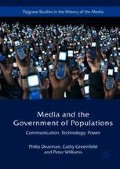Abstract
The first chapter brings into focus the book’s agenda, which is to bring a populational perspective to media and communication. First, it sketches how different people are placed in relation to broadband technology, the small and large problems presented by broadband, the social relations within which people are variously positioned, and the consequences of broadband for the actual lives of populations. Second, the chapter sets out key working concepts used throughout the book: communication, communication technologies, government, populations, rhetoric, and history.
Access this chapter
Tax calculation will be finalised at checkout
Purchases are for personal use only
References
Alasuutari, Pertti. 1995. Researching Culture: Qualitative Method and Cultural Studies. London: Sage.
Amin, Ash, and Nigel Thrift. 2013. Arts of the Political: New Openings for the Left. Durham and London: Duke University Press.
Bennett, Tony and Patrick Joyce (eds.). 2010. Material Powers: Cultural Studies, History and the Material Turn. New York and Oxon: Routledge.
Bourdieu, Pierre. 1979. “Public Opinion Does Not Exist.” In Communication and Class Struggle, Volume 1: Capitalism, Imperialism, edited by Armand Mattelart, and Seth Siegelaub, 124–130. New York: International General.
Chaterjee, Partha. 2004. The Politics of the Governed: Reflections on Popular Politics in Most of the World. Delhi: Permanent Black.
Dean, Mitchell. 2007. Governing Societies: Political Perspectives on Domestic and International Rule. Maidenhead, Berkshire: Open University Press.
Dean, Mitchell. 2013. The Signature of Power: Sovereignty, Governmentality and Biopolitics. London: Sage.
Department of Broadband, Communications and the Digital Economy. 2009. Australia’s Digital Economy: Future Directions. Canberra: Digital Economy Branch, DBCDE.
Dewey, Caitlin. 2014. “Absolutely Everything You Need to Know to Understand 4chan, the Internet’s Own Bogeyman.” The Washington Post, September 25. https://www.washingtonpost.com/news/the-intersect/wp/2014/09/25/absolutely-everything-you-need-to-know-to-understand-4chan-the-internets-own-bogeyman/?utm_term=.52f5d2c74dc2.
Economist Intelligence Unit. 2011. Full Speed Ahead: The Government Broadband Report Q2 2011. Executive Summary. https://www.eiu.com/public/topical_report.aspx?campaignid=BroadbandOct2011.
Foucault, Michel. 1977. Discipline and Punish: The Birth of the Prison. Translated by Allan Sheridan. London: Allen Lane.
Foucault, Michel. 1981. “Omnes et Singulatim: Towards a Criticism of Political Reason.” In The Tanner Lectures on Human Values, vol. 2, edited by Sterling M. McMurrin, 223–254. Cambridge: Cambridge University Press.
Freadman, Anne. 2009. “Habermas and the Politics of ‘Genre’.” Communication, Politics & Culture 42 (1): 74–95.
Goggin, Gerard. 2006. Cell Phone Culture. Oxon: Routledge.
Gulati, Girish, Jia Huang, Marco Marabelli, Joseph Weiss, and David Yates. 2016. “Determinants of Mobile Broadband Affordability: A Cross-National Comparison.” In 21st Americas Conference on Information Systems (AMCIS 2015), 2153–2165. Red Hook, NY: Curran Associates.
Hansen, Mark. 2012. “Foucault and the Media: A Missed Encounter?” South Atlantic Quarterly 111 (3): 497–528.
Hay, James. 2011. “‘Popular Culture’ in a Critique of the New Political Reason.” Cultural Studies 25 (4–5): 659–684.
Hindess, Barry. 1988. Choice, Rationality and Social Theory. London: Unwin Hyman.
Hu, Tung-Hui. 2015. A Prehistory of the Cloud. Cambridge: MIT Press.
Hunter, Ian. 1988. Culture and Government: The Emergence of Literary Education. London: Macmillan.
Isin, Engin, and Evelyn Ruppert. 2015. Being Digital Citizens. London: Rowan & Littlefield.
Johnson, Lesley. 1988. The Unseen Voice: A Cultural Study of Early Australian Radio. London: Routledge.
Keane, John. 2009. “Monitory Democracy and Media-Saturated Societies.” Griffith Review 24: 1–23.
Latour, Bruno. 2003. “What If We Talked Politics a Little.” Contemporary Political Theory 2 (2): 143–164.
Lee, Terence. 2010. The Media, Cultural Control and Government in Singapore. New York: Routledge.
Leith, Dick, and George Myerson. 1989. The Power of Address: Explorations in Rhetoric. London and New York: Routledge.
Marvin, Carolyn. 1989. When Old Technologies Were New: Thinking About Electric Communication in the Late Nineteenth Century. Oxford: Oxford University Press.
Mattelart, Armand. 1996. The Invention of Communication. Translated by Susan Emmanuel. Minneapolis: University of Minnesota Press.
McNair, Brian. 2006. Cultural Chaos: Journalism, News and Power in a Globalized World. London: Routledge.
Minson, Jeffrey. 1985. Genealogies of Morals: Nietzsche, Foucault, Donzelot and the Eccentricity of Ethics. London: Macmillan Press.
Muente-Kunigami, Arturo. 2014. “How Affordable Is Broadband?” 23 October 2014. Accessed 27 November 2017. http://blogs.worldbank.org/ic4d/how-affordable-broadband.
Nolan, David. 2008. “Tabloidization Revisited: The Regeneration of Journalism in Conditions of ‘Advanced Liberalism’.” Communication, Politics & Culture 41 (2): 100–118.
Odih, Pamela. 2010. Advertising and Cultural Politics in Global Times. Burlington: Ashgate.
OECD. 2017. “Households with Broadband Access.” http://dx.doi.org/10.1787/f9b84af5-en.
Ouellette, Laurie, and James Hay. 2008. Better Living Through Reality TV: Television and Post-welfare Citizenship. Malden: Blackwell.
Pasquino, Pasquale. 1978. “Theatrum Politicum: The Genealogy of Capital—Police and the State of Prosperity.” Ideology and Consciousness 4: 41–54.
Poe, Marshall. 2011. A History of Communications Media and Society from the Evolution of Speech to the Internet. Cambridge: Cambridge University Press.
Pollack, Sorcha. 2013. “Women Know Less About Politics Than Men Worldwide.” Guardian, 11 July. https://www.theguardian.com/news/datablog/2013/jul/11/women-know-less-politics-than-men-worldwide#data.
Robinson, Joan, and John Eatwell. 1973. An Introduction to Modern Economics. London: McGraw-Hill.
Telstra. 2011. “Advertising Series.” Sunday Age, September 25.
Thrift, Nigel. 2008. Non-representational Theory: Space | Politics | Affect. London and New York: Routledge.
U.S. Department of Commerce. 1995. Falling Through the Net: A Survey of the ‘Have Nots’ in Rural and Urban America. https://www.ntia.doc.gov/ntiahome/fallingthru.html.
Williams, Raymond. 1981. “Communication Technologies and Social Institutions.” In Contact: Human Communication and Its History, edited by Raymond Williams, 225–238. London: Thames and Hudson.
Yeates, Clancy. 2011. “Turnbull Seizes on Report on NBN.” Age, October 11.
Author information
Authors and Affiliations
Corresponding author
Copyright information
© 2018 The Author(s)
About this chapter
Cite this chapter
Dearman, P., Greenfield, C., Williams, P. (2018). Introduction: Communication, Government, Populations. In: Media and the Government of Populations. Palgrave Studies in the History of the Media. Palgrave Macmillan, London. https://doi.org/10.1057/978-1-137-34773-2_1
Download citation
DOI: https://doi.org/10.1057/978-1-137-34773-2_1
Published:
Publisher Name: Palgrave Macmillan, London
Print ISBN: 978-1-137-34772-5
Online ISBN: 978-1-137-34773-2
eBook Packages: HistoryHistory (R0)

